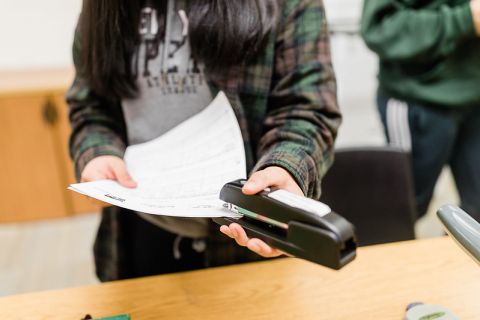Lieutenant Governorâs Medal for Inclusion, Democracy and Reconciliation
The Lieutenant Governor's Medal Program was created to recognize students who excel in their studies and contribute to the life of their institution or community.
Recent changes to the program criteria will now recognize students who have made outstanding contributions in the promotion of inclusion, democracy and/or reconciliation within their community campus.
Eligible programs:
Vocational or career programs less than two years in length, two-year diploma programs, or four-year undergraduate programs.
Amount of award:
One award of no monetary value. The selected student will have the honor of receiving the Lieutenant Governorâs Medal in recognition of their contributions to the community and/or campus.
Application deadline:
April 30
Eligibility
Eligible students include BC residents, out-of-province and international students enrolled in an eligible program of study at ÏãļÛÁųšÏēĘŋŠ―ą―áđûēéŅŊ and will be graduating this academic year.
Eligible students also demonstrate one or more of the following:
A student who has promoted inclusion and diversity demonstrating strong collaboration and unifying efforts toward diversity and inclusion, through the promotion and display of tolerance and respect for others.
Examples:
- A student may be recognized for their work in building community through the organization and coordination of events, activities, or services, that contribute to a more welcoming and supportive environment on campus.
- A student may be recognized for their work organizing a community response to an act of intolerance.
A student who has strengthened democracy through civic engagement or the advancement of human rights who demonstrates recognition for fundamental rights and dignity for all persons at a local, national or global level.
It is important to note that the Lieutenant Governorâs meal program is a non-partisan award. Activities ties to or coordinated by a political party or movement are not considered grounds for nomination.
Examples:
- A student may be recognized for their contribution to student governance or promoting social change and public discourse on campus, in their community, or online.
- A student may be recognized who has supported, advocated or empowered minority rights and/or the most vulnerable in society such as those with mental health or addiction challenges, the homeless, new immigrant youth or refugees.
A student who recognizes and answers the 2015 Truth and Reconciliation Commission's urgent call to contribute to and help transform society by establishing a renewed relationship with Indigenous peoples.
Examples:
- A student may be recognized for their collaboration with a local Indigenous community to start a for-profit business where proceeds support programming for Indigenous women.
- A student may be recognized for teaching Indigenous ways of knowing and doing (an Indigenous language, law, dance or another custom) to other students.
Application requirements
There are three ways students can be nominated for this award: student self-nomination, peer nomination or an ÏãļÛÁųšÏēĘŋŠ―ą―áđûēéŅŊ faculty and/or staff nomination.
Each nomination path is different. Detailed application requirements for each path are found below.
To self-nominate, students must:
- Complete the nomination form below.
- Submit a 500-750-word essay demonstrating examples of one or more of: Inclusion, Democracy and/or Reconciliation. Ensure to include examples of how you have made a positive contribution to the life of the college and/or your community and how you meet the criteria as outlined above.
- In addition, students must also provide, in a separate document, a detailed activity log of community/school involvement activities including description of activity, title or position held and the dates of said activity.
- Provide at least two letters of recommendation, one from an ÏãļÛÁųšÏēĘŋŠ―ą―áđûēéŅŊ staff member and one from a relevant source familiar with their activities, outlining why they should be considered.
To nominate a student, ÏãļÛÁųšÏēĘŋŠ―ą―áđûēéŅŊ faculty and/or staff members must:
- Complete the nomination form below.
- Provide a letter of recommendation outlining why the student should be considered.
Note: the student will be informed of the nomination via the email address submitted on the nomination form and will need to consent to release of information if awarded this medal.
Selection process
Selection will be made by an ÏãļÛÁųšÏēĘŋŠ―ą―áđûēéŅŊ selection committee. The committee will review applications and determine the successful recipient. As grade point average (GPA) is a criteria, the committee will be reviewing ÏãļÛÁųšÏēĘŋŠ―ą―áđûēéŅŊ transcripts. ÏãļÛÁųšÏēĘŋŠ―ą―áđûēéŅŊ may also give consideration to students who have overcome significant personal challenges and/or may be members of historically disadvantaged groups that face sociocultural barriers to full participation in BC society. For example, racialized students, LGBTQI2S+, single mothers, or students with refugee status.
The successful recipient will receive a congratulatory letter from the Lieutenant Governor. The award recipient will be invited to receive the medal at convocation, which may be formally presented by the Lieutenant Governor in-person.

